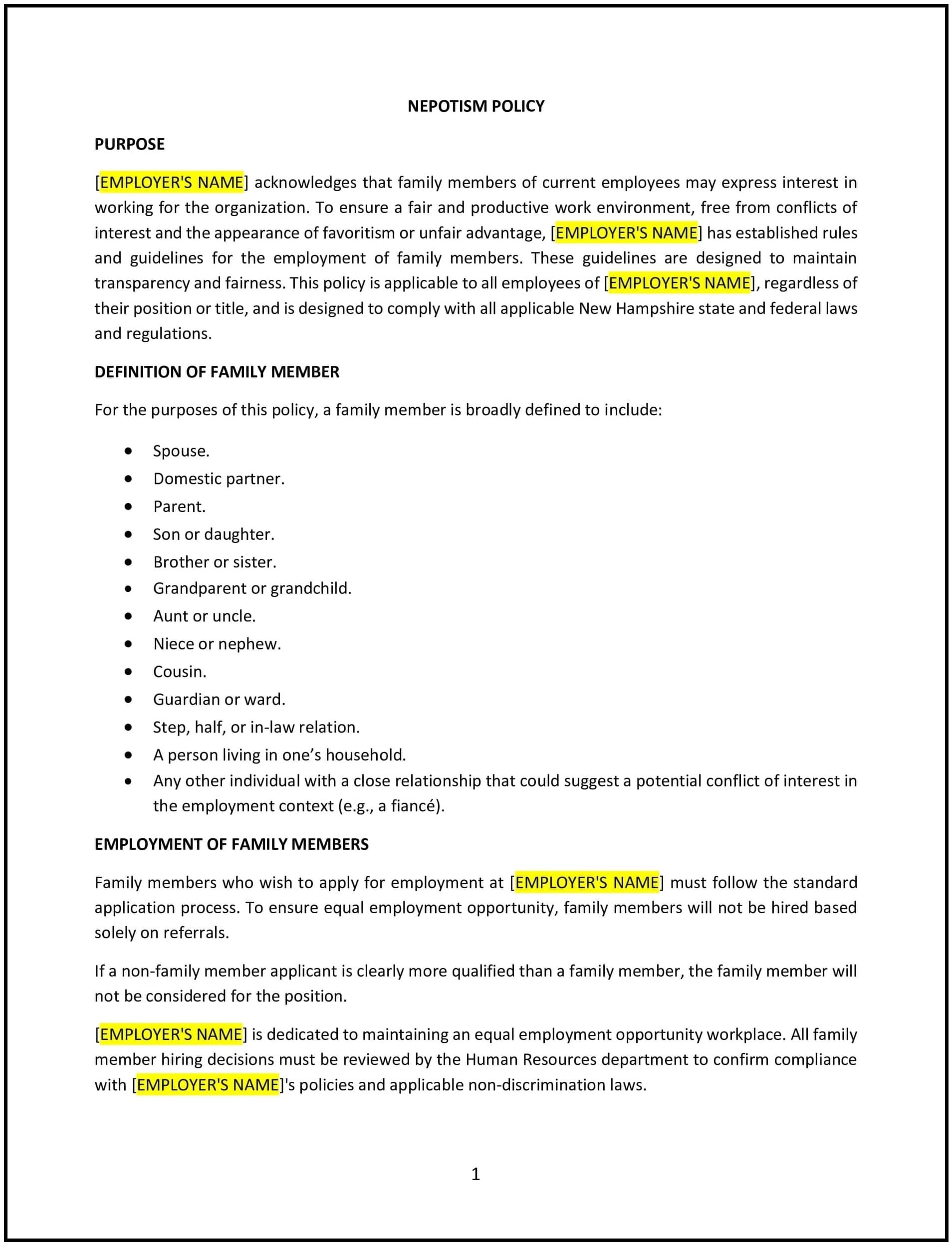Got contracts to review? While you're here for policies, let Cobrief make contract review effortless—start your free review now.

Customize this template for free
Nepotism policy (New Hampshire)
A nepotism policy helps New Hampshire businesses manage hiring, promotion, and employment decisions involving family members or close personal relationships. This policy establishes guidelines to prevent conflicts of interest, favoritism, or the appearance of unfair treatment, ensuring that all employment decisions are made based on merit and qualifications.
By implementing this policy, businesses can promote fairness, transparency, and equal opportunity while maintaining a professional and unbiased workplace culture.
How to use this nepotism policy (New Hampshire)
- Define nepotism: Clearly define nepotism within the company, specifying that it refers to the hiring, promotion, or other employment decisions involving family members, close relatives, or individuals with personal relationships with current employees.
- Outline prohibited actions: Identify situations where nepotism is prohibited, such as hiring or promoting family members into direct supervisory roles, or hiring individuals where conflicts of interest could arise due to family ties.
- Set guidelines for disclosure: Require employees to disclose any familial relationships or close personal connections with other employees before or during the hiring or promotion process.
- Provide a clear approval process: Establish a review and approval process for hiring or promoting family members or individuals with personal relationships, ensuring that decisions are made impartially and fairly.
- Promote merit-based hiring and promotion: Emphasize that hiring, promotion, and other employment decisions should be based on qualifications, experience, and performance, rather than family relationships or personal connections.
- Address conflict of interest situations: Outline procedures for handling potential conflicts of interest that arise from family relationships or close personal connections within the company, including steps to mitigate any undue influence on decision-making.
- Review and update: Regularly review and update the policy to reflect changes in state or federal employment laws, company needs, or industry standards.
Benefits of using this nepotism policy (New Hampshire)
This policy provides several benefits for New Hampshire businesses:
- Promotes fairness: By establishing clear guidelines for nepotism, businesses can prevent favoritism, ensuring that all employees are treated fairly and based on merit.
- Reduces conflicts of interest: The policy helps identify and address potential conflicts of interest arising from family relationships, ensuring that decisions are made impartially and without bias.
- Maintains a positive workplace culture: A well-defined nepotism policy fosters a professional environment where employees feel valued and confident that hiring and promotion decisions are fair and transparent.
- Enhances transparency: By requiring the disclosure of family relationships and close personal connections, the policy promotes transparency in hiring and promotion practices.
- Prevents legal risks: The policy helps businesses avoid potential legal issues related to discrimination, favoritism, or conflicts of interest by clearly outlining acceptable practices and providing a process for addressing concerns.
Tips for using this nepotism policy (New Hampshire)
- Communicate the policy clearly: Make sure all employees are aware of the company’s nepotism policy, including the guidelines for disclosing family relationships and how the approval process works.
- Be consistent: Apply the policy consistently to all employees, ensuring that nepotism-related decisions are handled fairly and transparently.
- Address potential conflicts early: Encourage employees to disclose family relationships or close personal connections as early as possible to avoid conflicts of interest later in the hiring or promotion process.
- Involve HR in decision-making: When nepotism-related decisions arise, involve human resources or senior management to ensure that decisions are made impartially and according to the policy.
- Regularly review the policy: Review the policy regularly to ensure it remains up to date and reflects any changes in state or federal laws, company needs, or industry practices.